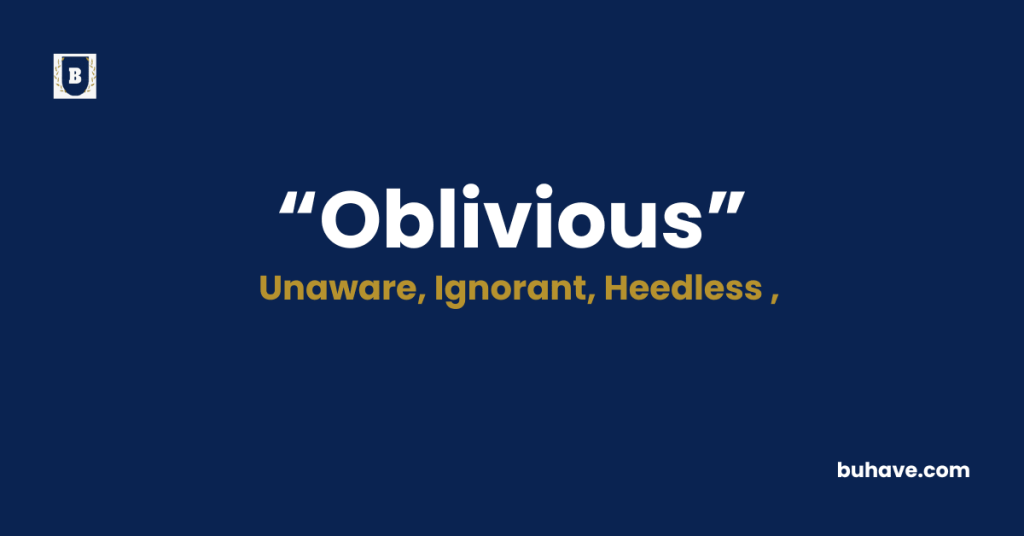The word Oblivious (Adjective) refers to being unaware or not conscious of something happening around you. In this guide, you’ll learn the full definition, synonyms, antonyms, etymology, and real-life examples of how to use Oblivious correctly in sentences.
Oblivious Explained in Depth
A complete and detailed guide to the word Oblivious including meaning, definition, examples, etymology, synonyms, and antonyms.
Meanings of Oblivious
Oblivious means lacking awareness or attention to one’s surroundings or to something specific. A person may be oblivious to noise, danger, feelings, or even obvious facts.
Definition
Oblivious describes a state of being unaware or not noticing something that is happening or exists. It often applies to people who are so focused on their own thoughts or activities that they fail to recognize important cues or situations. For example, someone might be oblivious to the fact that a friend is upset, despite clear emotional signals. It can also refer to a lack of awareness about risks, responsibilities, or social cues. While sometimes humorous, the term can carry serious implications, especially when the lack of awareness leads to misunderstanding or danger. In modern usage, it is common in both casual conversation and formal contexts. The word reminds us that attention and sensitivity to others and the environment are essential in communication, safety, and empathy.
Etymology
The word “oblivious” originates from the Latin word obliviosus, meaning “forgetful” or “prone to forgetting.” It is derived from oblivisci, which means “to forget.” The word entered Middle English in the 15th century through Old French as oblivius. Initially, it described forgetfulness, but over time, its usage shifted to include being unaware or unconscious of present things, not just forgotten memories. In literature and historical texts, it has often described characters lost in thought or unaware of their surroundings. Today, it captures the idea of being mentally absent or inattentive to the obvious, with its meaning retaining both literal and metaphorical power in daily language.
Example Sentences
- He walked through the crowd, completely oblivious to the stares he was receiving.
- She remained oblivious to the growing tension in the room.
- The child was so focused on his game that he was oblivious to the time.
Oblivious Synonyms
- Unaware
- Unmindful
- Heedless
- Inattentive
- Forgetful
- Distracted
- Daydreaming
- Neglectful
- Detached
- Absentminded
Oblivious Antonyms
- Aware
- Conscious
- Alert
- Mindful
- Observant
- Attentive
- Sensitive
- Noticing
- Vigilant
- Perceptive
FAQs about Oblivious
Here are some frequently asked questions (FAQs) about the word “Oblivious”
1. What does “oblivious” mean?
It means being unaware or not conscious of what is happening around you or to something specific.
2. Can “oblivious” be used positively?
Rarely. It usually highlights a lack of awareness, which can be neutral or negative depending on the situation.
3. Is “oblivious” the same as forgetful?
Not quite. “Forgetful” relates to memory loss, while “oblivious” refers to not noticing what’s happening in the moment.
4. Can someone be oblivious on purpose?
Sometimes people choose to ignore things, but true obliviousness usually involves an unconscious lack of awareness.
5. Is “oblivious” common in everyday speech?
Yes, it’s a widely used word in casual, professional, and literary language.

















